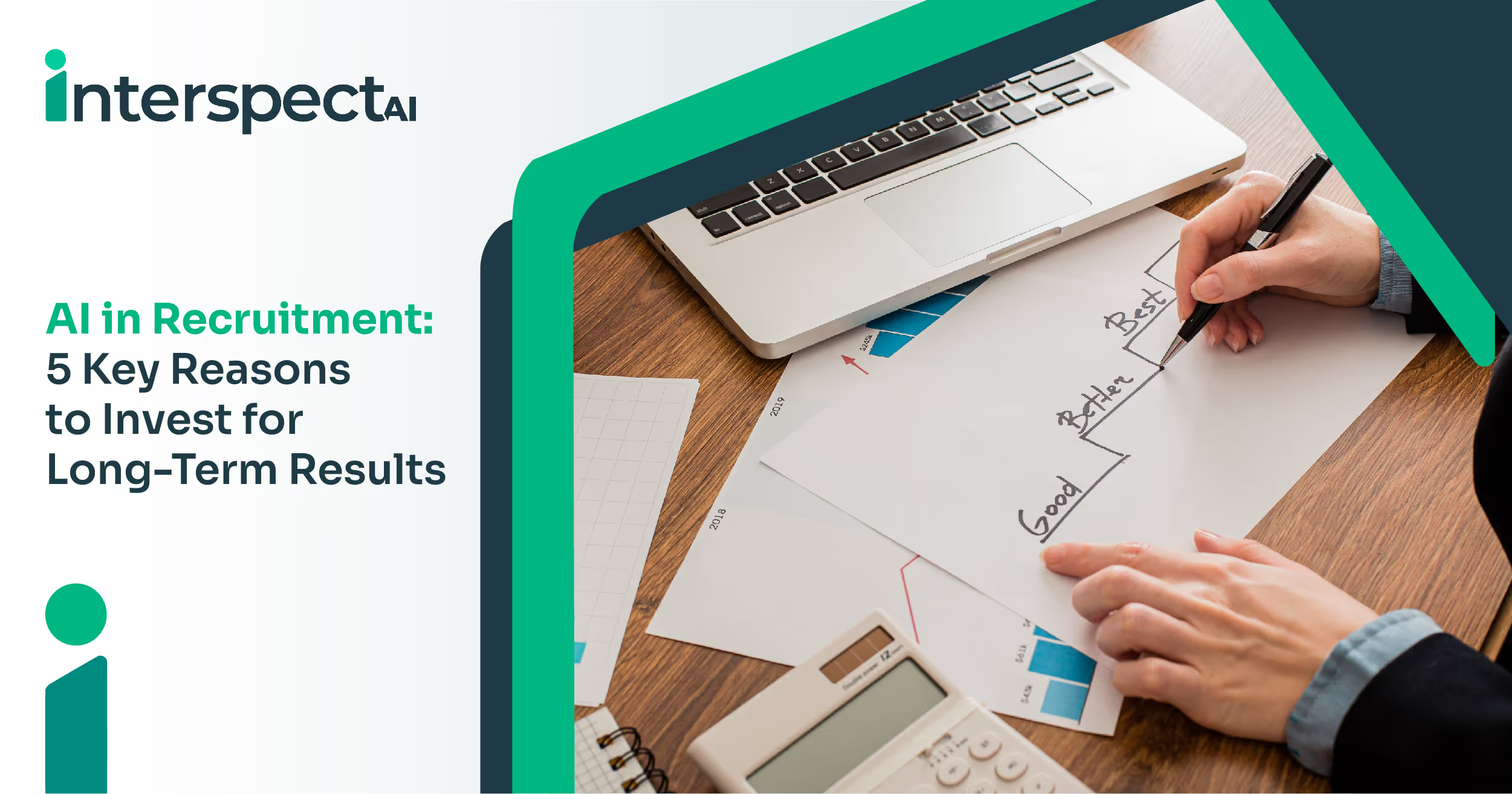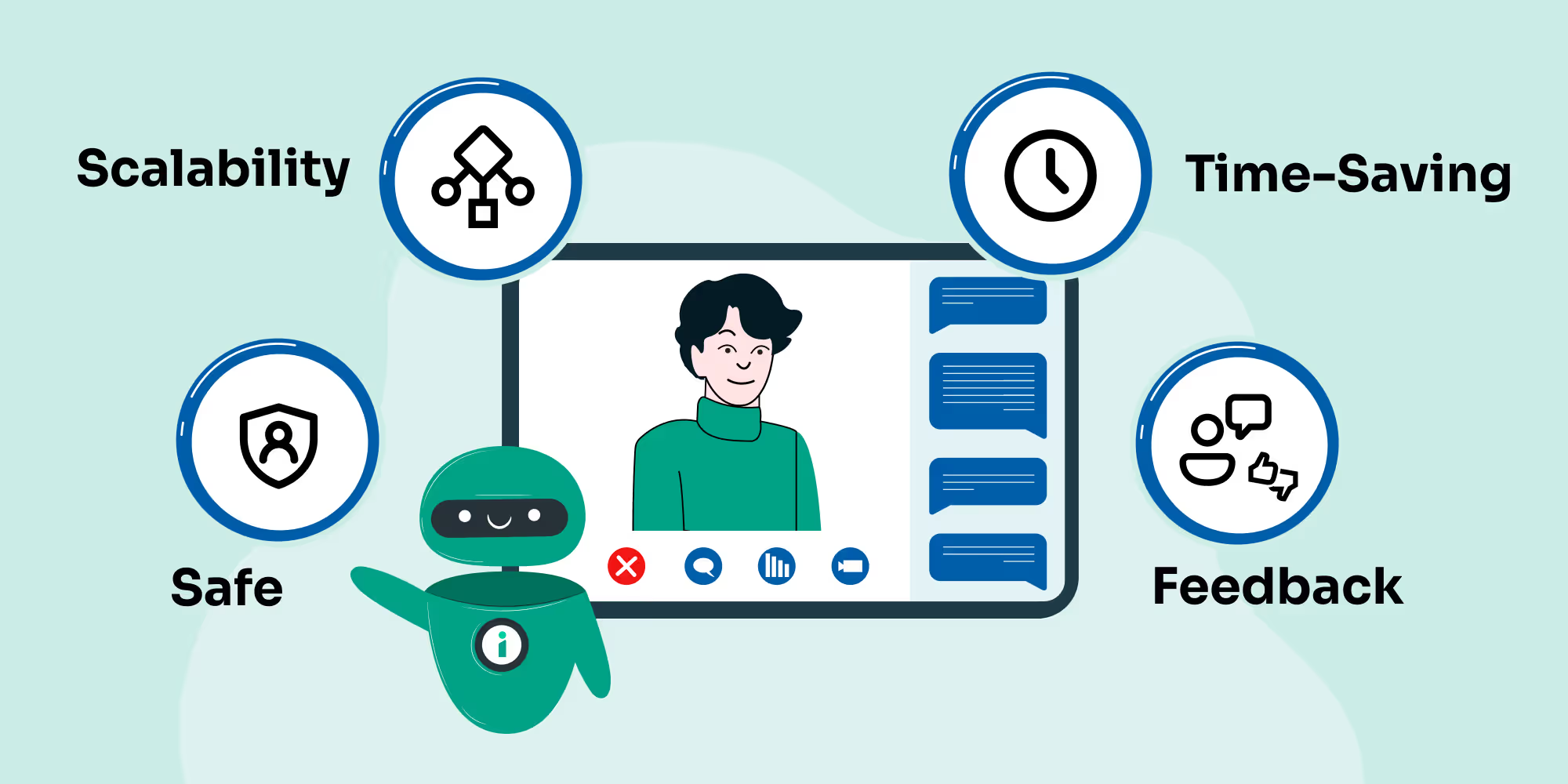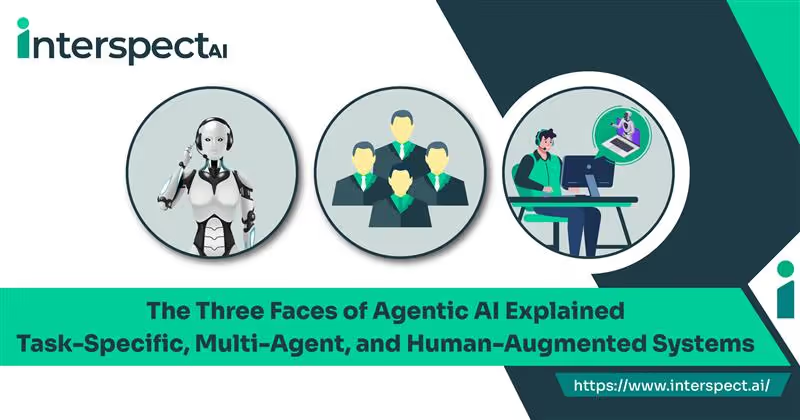AI in Recruitment: 5 Key Reasons to Invest for Long-Term Results



The recruitment landscape is undergoing a fundamental transformation. As talent acquisition becomes increasingly competitive and complex, forward-thinking organizations are turning to artificial intelligence not just as a temporary solution, but as a strategic investment in their long-term success.
The shift is undeniable. With the global AI recruitment market projected to grow from $660.17 million in 2025 to $1,125.84 million by 2033, it's clear that AI isn't just a trend—it's the future of hiring.
At the forefront of this evolution is SpectraHire by InterspectAI. This agentic AI-driven interview platform leverages AI agents capable of seeing, hearing, reasoning, and speaking to deliver comprehensive interview experiences. With instant automated insights and structured data extraction, SpectraHire represents the cutting edge of AI recruitment technology.
Here are five compelling reasons why investing in AI recruitment delivers measurable long-term results:
1. Dramatic Cost Reduction with Measurable ROI
Traditional recruitment is expensive, often costing thousands per hire. The hidden costs add up quickly: recruiter salaries, advertising spend, interviewer time, and the devastating impact of bad hires that can cost up to 30% of an employee's annual salary.
Companies implementing AI-powered hiring solutions report a reduction of up to 30% in recruitment costs. These savings come from multiple sources: automated resume screening eliminates hours of manual review, reduces dependency on external recruiting agencies, and improves candidate assessment accuracy, preventing costly hiring mistakes.
The efficiency gains are substantial. Instead of recruiters spending entire days screening hundreds of resumes, AI completes this task in seconds while maintaining consistent evaluation criteria.
SpectraHire's Advantage: By automating the entire interview process, SpectraHire eliminates the need for multiple human interviewers while providing a more comprehensive candidate assessment than traditional methods, resulting in direct cost savings and improved hiring accuracy.
2. Accelerated Time-to-Hire Without Quality Compromise
Speed matters in today's competitive talent market. Every additional day in the hiring process risks losing top candidates to faster competitors. Traditional hiring processes average several weeks, but AI is changing this dramatically.
Companies like Unilever have transformed their hiring timelines, reducing time-to-hire by 75% using AI to analyze video interviews. A Berlin tech startup slashed its average hiring time from 27 days to just 7 days after implementing AI recruitment tools.
The acceleration happens across every stage: automated screening processes instantly evaluate candidates, AI-powered assessments objectively assess skills, and intelligent scheduling eliminates coordination delays. What once took weeks now happens in days, giving organizations significant competitive advantages in securing top talent.
SpectraHire's Speed Advantage: With AI agents conducting interviews 24/7 and providing instant automated insights, SpectraHire eliminates scheduling delays and lengthy evaluation periods. Candidates complete interviews immediately, and hiring managers receive comprehensive assessments within hours rather than weeks.
3. Enhanced Quality of Hire Through Data-Driven Decisions
While speed is essential, quality remains paramount. AI doesn't just hire faster—it hires better by leveraging data analytics and predictive modeling to identify candidates most likely to succeed in the long term.
Human decision-making in hiring, while valuable, has natural limitations. We can process only so much information simultaneously, and unconscious biases can influence our judgments. AI-driven interview analytics increase hiring accuracy by 40%, analyzing multiple data points concurrently and identifying patterns that escape human observation.
Performance ratings of AI-assisted hires consistently exceed those of traditional hires, with better retention rates and higher job satisfaction scores. The technology doesn't replace human judgment—it augments it with objective data insights that lead to smarter hiring decisions.
SpectraHire's Quality Assurance: The platform's AI agents analyze not just what candidates say, but how they communicate, reason, and problem-solve. This multidimensional assessment provides deeper insights into candidate potential, leading to more informed hiring decisions and enhanced long-term employee performance.
4. Significant Bias Reduction and Improved Diversity
Traditional hiring processes are susceptible to unconscious bias, which can limit diversity and potentially exclude qualified candidates. AI offers a path to more objective, equitable hiring practices by focusing on job-relevant factors rather than demographic characteristics.
The results speak for themselves. Dell Technologies achieved a 300% increase in diverse candidates after incorporating AI-driven metrics. Companies implementing AI recruitment see more equitable treatment across different demographic groups and substantial increases in diverse candidate representation.
When properly implemented, AI systems evaluate candidates based on skills, experience, and performance indicators rather than names, backgrounds, or other potentially biasing factors. This isn't just about compliance—diverse teams consistently outperform homogeneous ones, making bias reduction a business imperative.
SpectraHire's Fair Assessment: With non-profiling algorithms and standardized evaluation criteria, SpectraHire ensures every candidate receives the same objective assessment, focusing on skills and capabilities rather than demographic factors to promote fairer hiring outcomes.
5. Scalable Efficiency That Grows with Your Business
The most compelling long-term benefit of AI recruitment is its scalability. Traditional scaling involves hiring additional recruiters and expanding HR teams in proportion. AI offers a different path—systems that handle increased volume while maintaining quality and consistency.
AI hiring tools improve workforce efficiency by automating 40% of repetitive recruitment tasks, allowing human recruiters to focus on relationship building and strategic planning. Whether hiring 10 or 1,000 candidates, AI tools provide the same thorough assessment and objective evaluation.
This scalability advantage becomes crucial for growing businesses, seasonal hiring needs, or organizations expanding into new markets. The system continually learns and improves, delivering increasing returns on investment as it processes more data.
SpectraHire's Enterprise Scalability: The platform conducts a large number of interviews simultaneously across different time zones. Whether hiring entry-level employees or executives, SpectraHire maintains consistent quality and provides structured data that integrates seamlessly with existing HR systems.
The Strategic Imperative
AI recruitment isn't just about immediate improvements—it's about building competitive advantages that compound over time. Unlike traditional hiring methods with static efficiency levels, AI systems continually earn and improve, creating a virtuous cycle of continuous improvement.
Organizations that invest in AI recruitment now position themselves to attract top talent, reduce operational costs, and build more diverse, high-performing teams. The question isn't whether AI will transform recruitment—it's whether your organization will lead this transformation or follow it.
The convergence of cost reduction, improved speed and quality, enhanced diversity, and scalable efficiency creates a compelling case for investment that delivers both immediate results and long-term strategic advantages.
Ready to transform your recruitment strategy?
Discover how SpectraHire by InterspectAI can deliver measurable long-term results.
Frequently Asked Questions
What ROI can I expect from AI recruitment tools?
Companies that streamline their recruitment processes or adopt hiring technology often report cost savings of 20–50%, along with reduced time-to-hire—sometimes cutting hiring timelines by several weeks. Many of these benefits begin to appear within the first few months of implementation.
How quickly do organizations see results?
Most organizations report measurable improvements within the first few months, with faster hiring processes and improved candidate quality becoming evident in early implementations.
Does AI recruitment improve diversity?
Yes, properly implemented AI systems can significantly reduce hiring bias by focusing on job-relevant factors, resulting in more diverse candidate pools and fairer hiring outcomes.
Can AI recruitment scale with business growth?
Absolutely. AI systems handle increased hiring volume without proportional resource increases, making them ideal for growing businesses or organizations with fluctuating hiring needs.
Subscribe to The InterspectAI Blog


%201.svg)






